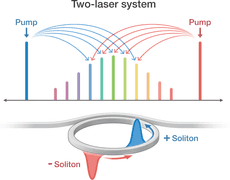Grégory Moille
Associate Research Scientist
Research Scientist

Contact Information
UMD
- Email:
- gmoille@umd.edu
- Office:
2249 Atlantic Building
College Park, MD 20742- Lab:
- PSC B0150
Additional Info
- CV:
- cv.pdf
- Google Scholar
- View Profile
- Github
- View Profile
About
Grégory Moille is a Associate Research Scientist working at both the NIST and UMD campuses. He received his M.S. in Physics and Photonics from Grenoble Institut National Polytechnique, France. He received his Ph.D. in Physics from Paris Saclay University, France. His doctoral research focused on the non-linear dynamics of photonic crystal cavities made of III-V materials, as well the fabrication and improvement of these devices. His research currently focuses on chip-scale silicon nitride micro-resonators for nonlinear optics, specifically dissipative Kerr solitons/frequency combs and their nonlinear dynamics for metrology applications.
Research Groups
JQI
Recent Publications
All-optical noise quenching of an integrated frequency comb
, , Optica, 12, 1020–1030, (2025)Dynamic tuning of soliton microcomb repetition rate without direct cavity actuation
, , Optics Continuum, 4, 1744-1753, (2025)Multi-color solitons and frequency combs in microresonators
, , Optics Express, 33, 21824, (2025)


